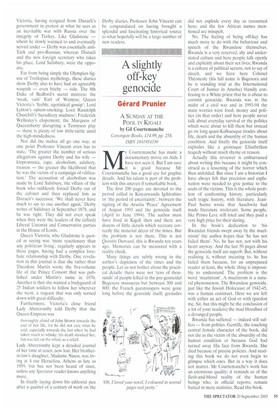A slightly off-key genocide
Gerard Prunier
A SUNDAY AT THE POOL IN KIGALI by Gil Courtemanche Canongate Books, 174.99. pp. 258, ISBN 1841954330 mr Courtemanche has made a documentary movie on Aids. I have not seen it. But I am sure it is good because Mr Courtemanche has a good eye for graphic details, And his talent is part of the problem with this uneven if remarkable book.
The first 200 pages are devoted to the period called in Kinyalwanda Igihirahiro or 'the period of uncertainty', between the signing of the Arusha 'Peace' Agreement of August 1993 and the genocide itself (April to June 1994). The author must have lived in Kigali then and there are dozens of little details which recreate correctly the material decor of the times. But the problem is not there. This is not Quentin forward, this is Rwanda ten years ago. Memories can be measured with a reality check. Many things are subtly wrong in the author's depiction of the times and the people. Let us not bother about the practical details: there were not 'tens of thousands' of people killed in the pre-genocidal Bugesera massacres but between 300 and 800; the French paratroopers were gone long before the genocide itself; grenades
did not explode every day as recounted here; and the few African names mentioned are misspelt. No. The feeling of being off-key has much more to do with the behaviour and speech of the Rwandese themselves. Rwanda is a very reserved, shy and understated culture and here people talk openly and explicitly about their sex lives: Rwanda is a culture of political secrets, not to say of deceit, and we have here Colonel Theoneste (his full name is Bagosora and he is standing trial at the International Court of Justice in Arusha) blandly confessing to a White priest that he is about to commit genocide; Rwanda was in the midst of a civil war and in 1993-94 the main worries were food, money and politics (in that order) and here people never talk about everyday survival or the politics which were about to kill them but instead go on long quasi-Kafkaesque tirades about life, death and the absurdity of the human condition. And finally the genocide itself explodes like a grotesque Elizabethan tragedy without much rhyme or reason. Actually this reviewer is embarrassed about writing this because it might be construed as a lessening of the horror which then unfolded. But since I am a historian I have always felt that precision and explanation were needed to give justice to the souls of the victims, This is the whole problem of confronting history, particularly such tragic history, with literature. JeanPaul Sartre wrote that Auschwitz had made literature irrelevant. Some people, like Primo Levi, still tried and they paid a very high price for their daring.
In the book's dedication to 'his Rwandan friends swept away by the maelstrom' the author hopes that 'he has not failed them'. No, he has not, not with his heart anyway. And the last 50 pages about the genocide itself are superb. But, without realising it, without meaning to. he has failed them because, for an unprepared reader at least, the whole thing is impossible to understand. The problem is the word 'maelstrom'. A maelstrom is a natural phenomenon. The Rwandese genocide, just like the Jewish Holocaust of 1942-45, was a human construct. Here we are left with either an act of God or with (pardon me, Sir, but this might be the conclusion of a lot of your readers) the mad bloodlust of a deranged people.
Rwanda has suffered — indeed still suffers — from politics. Gentille, the touching central female character of the book, did not die as the victim of the absurdity of the human condition or because God had turned away His face from Rwanda. She died because of precise policies. And reading this book we do not even begin to glimpse which ones. But in a way it does not matter. Mr Courternanche's work has an enormous quality: it reminds us of the flesh-and-blood reality of the human beings who, in official reports, remain buried in mere statistics. Read this book.


















































































 Previous page
Previous page